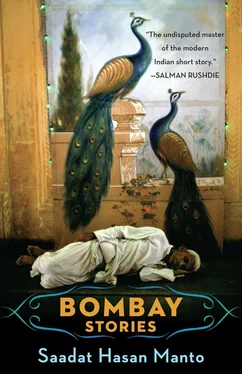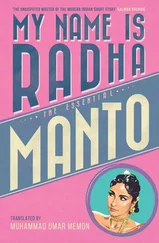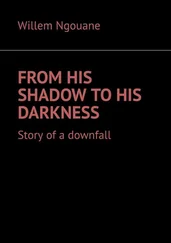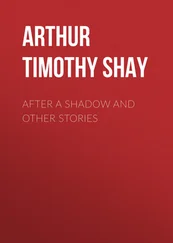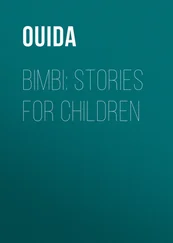‘Yes. If you think it’s right, shave it off. It’s a question of the courtroom, and really your moustache is very intimidating.’
The next day, Mammad Bhai shaved off his moustache, and yet he did so only on the advice of others.
His case came before the bench of Mr F.H. Teague. I was there. There were no witnesses against him, but the judge declared him a dangerous criminal and ordered him to leave the state. He had just one day to put all his affairs in order before leaving Bombay.
After leaving the courtroom, he didn’t say anything to me. Over and over he raised his fingers to his cleanly shaven face, but there wasn’t anything there to stroke.
Just before he had to leave Bombay that evening, we met in an Iranian restaurant. Twenty or so apprentices surrounded him, and they were all drinking tea. When he saw me, he didn’t say anything. Without his moustache, he looked entirely respectable. But I could tell he was sad.
I sat down next to him and asked, ‘What’s wrong, Mammad Bhai?’
He unleashed a directionless curse and then said, ‘Hell, Mammad Bhai’s dead.’
‘Don’t worry. If you can’t live here, another place will do.’
He launched into an expletive-filled tirade against every other possible place to live. Then he said, ‘It’s not about where I’m going to live. Here or somewhere else, it’s all the same. But why the hell did I have to shave off my moustache?’
He recited a litany of curses against those who had told him to shave it off. Then he asked, ‘Hell, if I have to leave the city, then why not go with my moustache?’
I couldn’t help but laugh. He flew into a rage. ‘What kind of man are you, Vamato Sahib? Fuck, I swear they should’ve hanged me! But I’m to blame for this foolishness. I never feared anyone but, hell, then I got scared of my moustache.’
He slapped his face twice. ‘Mammad Bhai, a curse on you! Asshole, you got scared of your moustache! Now get out of here, you mother …’
Tears welled in his eyes. How strange they looked against his clean-shaven face!
SAADAT HASAN MANTO — HIS LIFE
Saadat Hasan Manto was born on May 11, 1912 in the small town of Samrala near Ludhiana, a major industrial city in the current-day Indian state of the Punjab. 1He claimed allegiance not only to his native Punjab but also to his ancestors’ home in Kashmir. 2While raised speaking Punjabi, 3he was also proud of the remnants of Kashmiri culture that his family maintained — food customs, as well as intermarriage with families of Kashmiri origin — and throughout his life he assigned special importance to others who had Kashmiri roots. 4In a tongue-in-cheek letter addressed to Pundit Jawaharlal Nehru, he went so far as to suggest that being beautiful was the second meaning of being Kashmiri. 5
Manto’s father, Maulvi Ghulam Hasan, was a lawyer from a family of lawyers. 6He married twice, and Manto was the last of twelve siblings and the only son from his father’s second marriage. 7Hasan transferred to Amritsar some time after Manto’s birth, and Manto grew up there in Lawyers’ Lane, the area of town where lawyers resided. 8He was a strict disciplinarian with whom the teenage Manto had a somewhat contentious relationship. Manto liked to portray his parents as opposites, with his father’s coldness offset by his mother’s warmth, 9and while Manto never wrote much about his father, he did recount in the sketch ‘Two Encounters with Agha Hashr’ an incident in which his father swooped down upon the informal drama club that several high school friends and he had put together, broke the harmonium and tabla the boys had been using for musical accompaniment, and made it absolutely clear that he considered such activities an utter waste of time. 10
While Manto’s three elder half-brothers followed in the family tradition and became lawyers, 11Manto didn’t have the temperament to become a lawyer, and his school career as such was marked more by failure than success. In the Indian educational system, students must pass a final high school examination to be eligible for college, which Manto failed in his first two attempts because of poor scores in, of all subjects, Urdu. 12After barely passing in his third effort, he entered the Hindu Sabha College in Amritsar in 1931. 13At the end of his first year, he failed the annual year-end tests, and after failing again the subsequent year, he dropped out. 14To complicate matters further, his father died on February 25, 1932. 15
During these years, Manto did have the good fortune to meet Abdul Bari Alig, an editor of the Amritsar newspaper Equality . 16Bari Sahib served as a writing mentor for the young Manto. Under Bari Sahib’s tutelage, Manto translated Victor Hugo’s novella The Last Day of a Condemned Man , 17and the resulting book was published in Lahore in 1933. 18This first translation was followed by three more projects. With the help of Bari Sahib, 19he and his friend Hasan Abbas translated Oscar Wilde’s play Vera, or the Nihilists , 20a melodrama about the despotism of the Russian monarchy and the efforts of a group of revolutionaries to overthrow the old order. After that he would go on to publish two collections of translated Russian short stories— Russian Short Stories and Gorky’s Stories , a collection of Maxim Gorky’s short fiction. 21These earliest literary efforts showed Manto’s ideological fervour and passion for social justice. They also revealed his tendency toward iconoclasm. Bari Sahib also introduced Manto to Communism. Manto later admitted that when Bari Sahib wrote an essay ‘From Hegel to Karl Marx’ for his short-lived journal Creation , 22he hadn’t even heard the name Hegel and knew Marx only as someone Bari Sahib talked about as a friend of the working classes. 23Yet Manto took it upon himself to learn more about the Communist cause, and later he put his learning to use when he wrote a thumbnail historical essay on the Bolshevik Revolution, 24as well as his short story ‘Rude’, included in this volume. Manto’s debt to Bari Sahib was immense. He gave him what every young writer needs, both good writing advice and publication, 25and Manto noted sardonically that if he had not met Bari Sahib, he might have become not a writer but perhaps a criminal. 26
Manto’s second attempt at university began in July 1934. 27This time he travelled far from home to enter the prestigious Aligarh Muslim University. His career there did not last long, although this time it was not due to poor study habits. After nine months, he was diagnosed with tuberculosis. 28This diagnosis, which later turned out to be incorrect, was a heavy blow to his scholastic ambitions since tuberculosis was then a deadly disease. 29He left the university, borrowed money from his elder sister, and retreated into the mountains, spending three months in a sanitarium in the small northern town of Batot. 30Whatever the original cause of the chest pains he had been suffering in Aligarh had been, his health improved somewhat in the high altitude of the mountains. He returned to Amritsar in late 1935 and faced yet another set of challenges; his mother was without money and he realized he would have to start earning his own living. The next year his life would change considerably when he accepted the offer of Nazir Ludhianvi to go to Bombay to edit his weekly film newspaper The Painter . 31
Thus began the second era of Manto’s young life. When he arrived in Bombay, he was twenty-four years old. Manto would live in Bombay twice: from 1936 to 1941; and then after a hiatus of one and a half years, from 1942 until his final move to Lahore in 1948. In hindsight, he would recognize that these Bombay years were the best and most enjoyable of his life; and yet while Manto lived there his frequent bouts of ill health 32coupled with his temperamental personality meant that his time in Bombay was not at all free of disappointments, sadness, or angst.
Читать дальше
